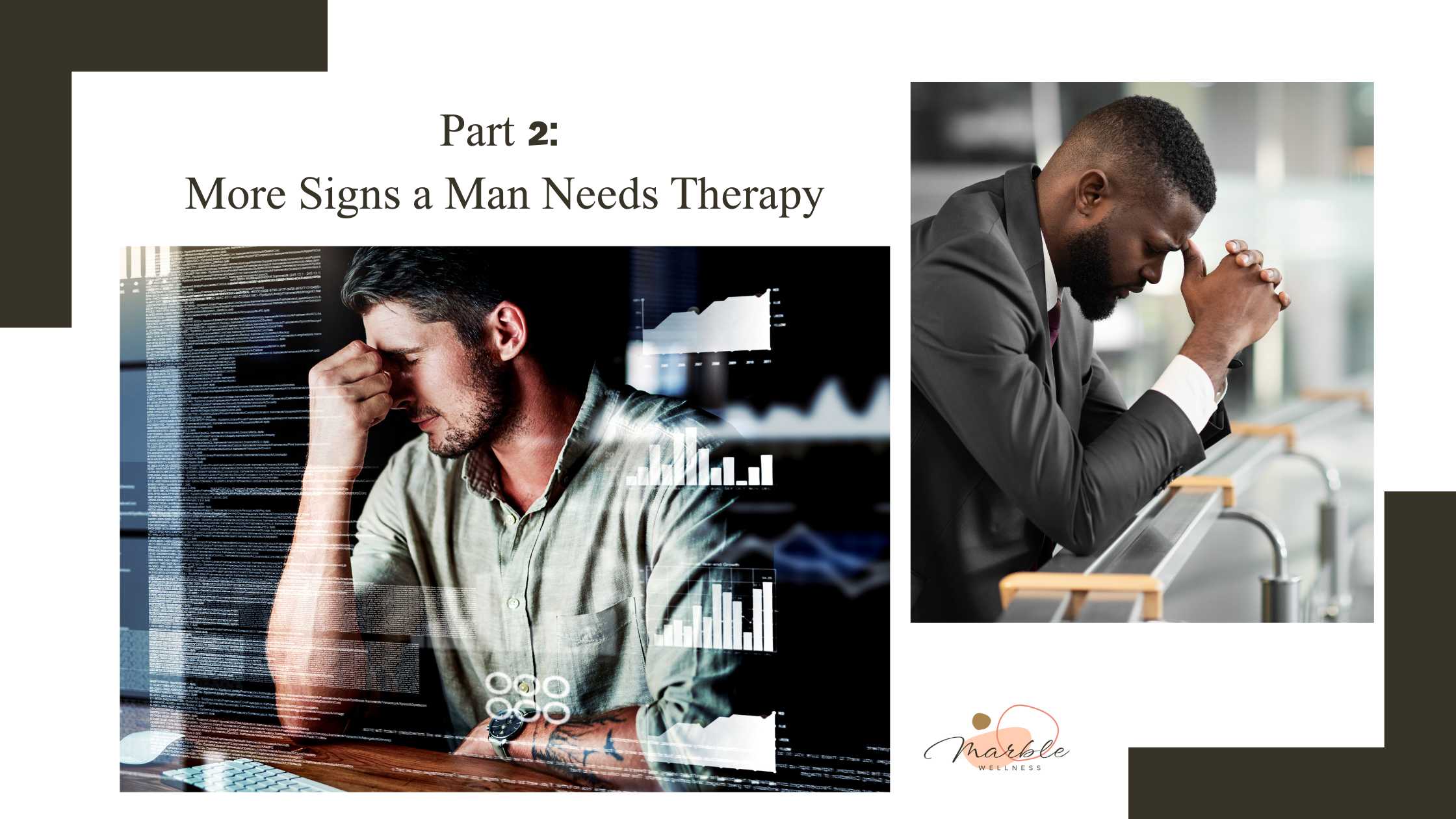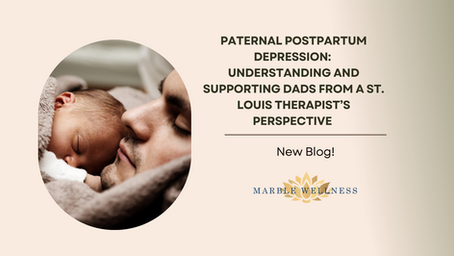In the first part of this blog series, we discussed some common signs of depression in men, such as persistent sadness, changes in sleep patterns, and loss of interest in activities. But depression and other mental health issues can manifest in various ways, some of which might not be immediately obvious. As a mental health therapist with a focus on men wellbeing, I can help provide more signs a man needs therapy.
Increased Use of Alcohol or Drugs
Using alcohol or drugs to cope with emotions or stress can be a sign of underlying mental health issues. While occasional drinking is normal, relying on substances to numb feelings or escape reality indicates a problem that therapy can help address.
Chronic Irritability or Anger
Everyone gets irritated or angry from time to time, but if these emotions become a constant state of being, it might be a sign of deeper issues. Chronic irritability can strain relationships and negatively impact one’s quality of life. Therapy can provide tools to manage anger and explore its root causes.
Feelings of Worthlessness or Guilt
Persistent feelings of worthlessness, excessive guilt, or a sense of failure are serious indicators of depression. These feelings can be overwhelming and often prevent individuals from seeking help, making it crucial to recognize them as signs to consult a therapist.
Neglecting Responsibilities
When a man starts neglecting his responsibilities at work, home, or in social settings, it can be a red flag for depression or other mental health issues. This neglect can manifest as missing deadlines, failing to fulfill commitments, or withdrawing from family activities.
Persistent Physical Symptoms
Unexplained physical symptoms such as headaches, stomach issues, or chronic pain can sometimes be linked to mental health problems. If medical evaluations don’t reveal a clear cause for these symptoms, it might be time to consider the role of emotional stress and seek therapy.
Trouble in Relationships
Consistent conflicts or communication issues in personal relationships can indicate underlying mental health struggles. Whether it’s with a partner, family members, or friends, unresolved emotional issues can manifest as relational problems. Therapy can help improve communication skills and address the root causes of these conflicts.
Risk-Taking Behaviors
Engaging in risk-taking behaviors, such as reckless driving, unsafe sexual practices, or other dangerous activities, can be a way to cope with emotional pain. These behaviors can have serious consequences and are often a sign that professional help is needed.
Overwhelming Anxiety
While anxiety is a normal response to stress, excessive and uncontrollable anxiety can be debilitating. If anxiety is interfering with daily life, causing panic attacks, or leading to avoidance behaviors, therapy can be incredibly beneficial.
Difficulty Managing Stress
If everyday stressors feel insurmountable and you find yourself unable to cope with even minor challenges, this is a sign that you might benefit from therapy. A mental health professional can help you develop better stress management techniques.
Obsessive or Compulsive Behaviors
Engaging in repetitive behaviors or having intrusive thoughts that are difficult to control can indicate obsessive-compulsive disorder (OCD) or other anxiety disorders. Therapy, particularly cognitive-behavioral therapy (CBT), can be effective in treating these issues.

If you or someone you know is experiencing several of these signs, it’s important to recognize that seeking help is a positive and proactive step. Therapy provides a supportive environment to explore these symptoms, understand their origins, and develop effective coping strategies.
Therapy for men offers numerous benefits:
- Improved Mental Health: Addressing the root causes of emotional distress can lead to significant improvements in overall mental health.
- Better Relationships: Learning healthy communication and conflict resolution skills can enhance personal relationships.
- Enhanced Coping Skills: Developing effective coping mechanisms for stress, anxiety, and depression can improve daily functioning.
- Greater Self-Awareness: Therapy can help men gain a deeper understanding of themselves, leading to personal growth and fulfillment.
Start Therapy for Men in St. Louis, MO
Acknowledging the need for therapy is a sign of strength. Whether you’re dealing with depression, anxiety, or other mental health issues, professional help is available. If you’re in St. Louis, Chicago, or beyond, consider reaching out to a therapist who specializes in men’s mental health. Your well-being is worth the investment.
Contact Us!
Additional Counseling Services at Marble Wellness in St. Louis, MO and Chicago, IL
Counseling services designed to help set you on a path of living a more fulfilled, calm, and happy life.
St. Louis
Our St. Louis team of therapists have a variety of training backgrounds and areas of expertise. We specialize in anxiety, depression, grief, chronic illness, therapy for men, couples, and maternal overwhelm. We can also help new moms with various postpartum concerns, moms in the thick of parenting, and moms with teens. We can also chat from wherever you are in the state with online therapy in Missouri and online therapy in Illinois. No matter where you are in your journey, we would love to support you.
Chicago
Our Chicago team of therapists offer a wide range of mental health services to help our clients through the different challenges and hurdles in their life. In addition to anxiety, depression, grief, therapy for men, and maternal overwhelm, we are specialized in professional burnout, therapy for breakups, and love partnering with working moms.




